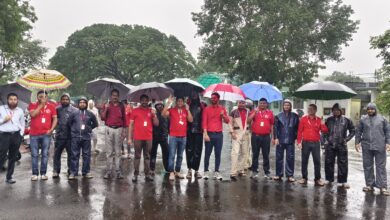Indefinite Strike Of Central And State Government Employees Demanding Scrapping NPS From 1st May 2024
On NPS issue, how can Government Employees organizations remain silent spectators, asks C. Srikumar, General Secretary AIDEF
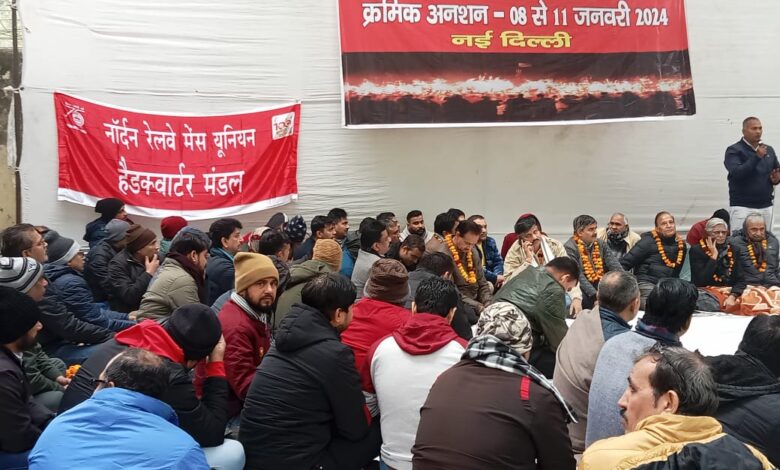
The 20 years long drawn struggle of the Central Government Employees and State Government Employees have now come to its peak. The Joint Forum for Restoration of Old Pension Scheme (JFROPS) which is spearheading a National Movement for the past more than one year with the demand to Scrap the no guarantee National Pension System (NPS) introduced by the Government to its employees who are recruited on or after 01-01-2004.
In a meeting of the core committee of the JFROPS held on 28th of February, 2024, it was decided that all the Central Government Employees and state Government Employees including the teaching staff will go for an Indefinite Strike with a single point of demand of “Scrap the No Guarantee NPS and to Restore the Defined and Guaranteed Pension under CCS (Pension) Rules 1972 (now 2021)” All the Unions and Associations and their Federations will issue strike notice to the Government / Employer on the 19th of March, 2024, and the Indefinite Strike will commence from the 1st of May, 2024, the International Day of Working class.
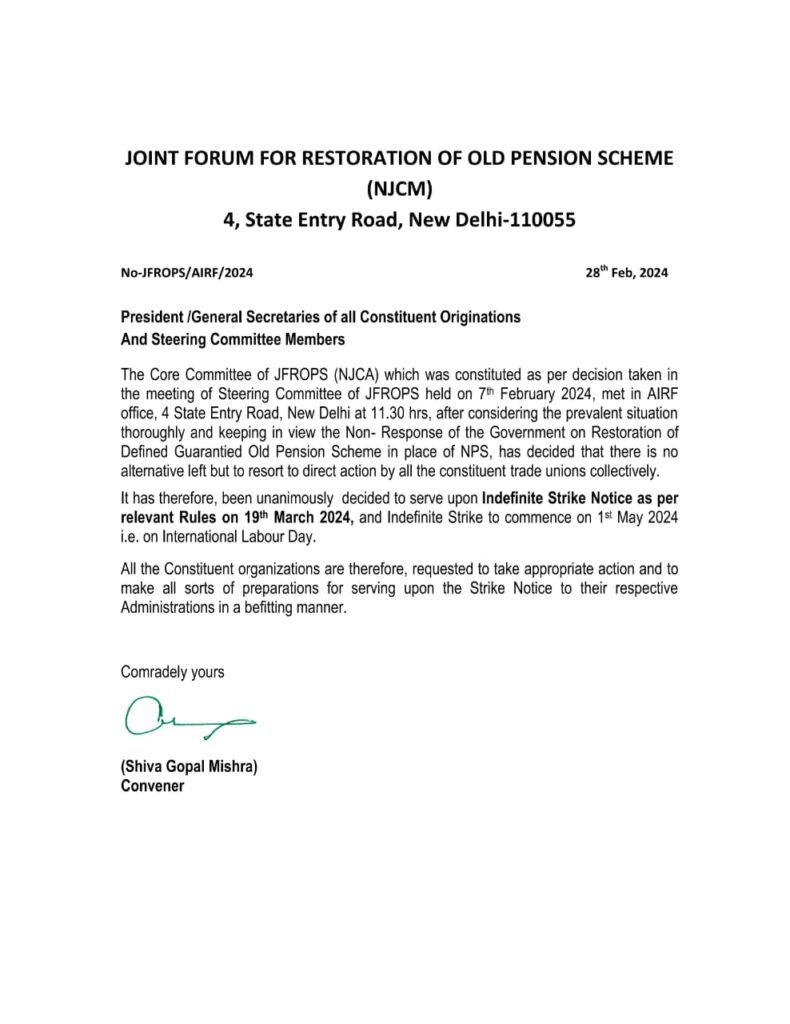
Earlier, Railways and Defence industry took a strike ballot throughout the country and almost 100 percent of the employees voted in favor of an indefinite strike. The Strike will start in the midst of Parliament Election. Whether during this period the nation will come to a standstill?, wheels of the trains will stop running ?, Defence production will come to a halt?, Central and State Secretariat will have a vacant look ?, Whether a caretaker Government will be able to negotiate with the JFROPS and reach an agreement ?
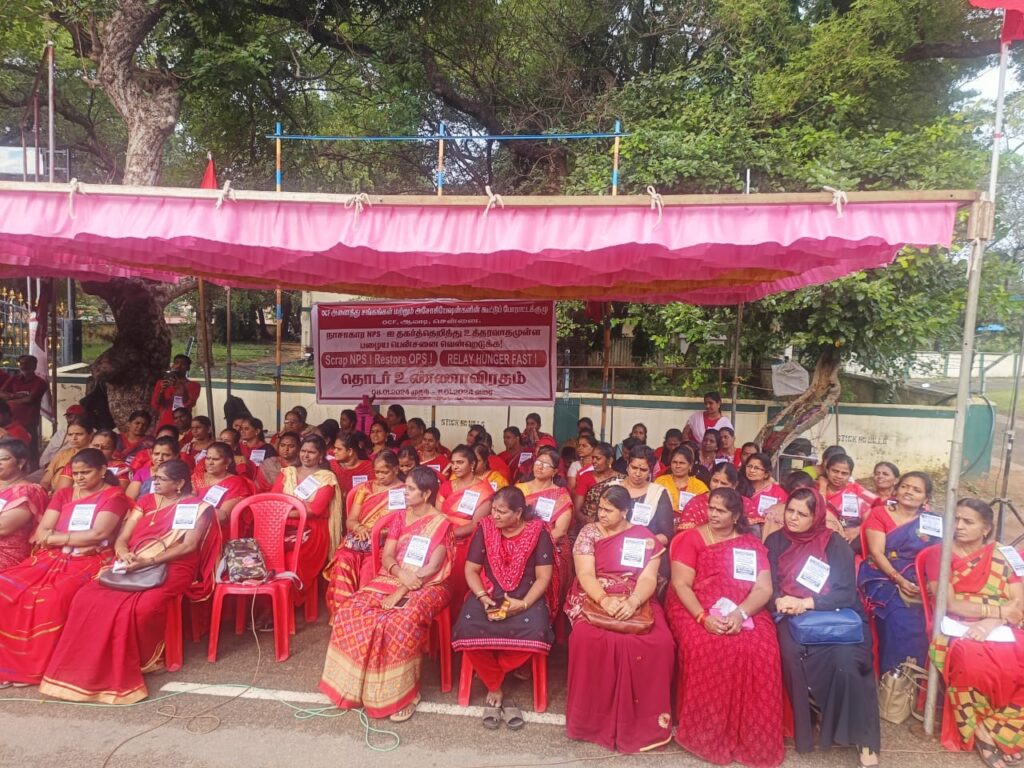
With these questions www.indianpsu.com approached C. Srikumar, who is a member of the Steering Committee of the JFROPS along with their President S.N. Pathak and the leaders of Railways, Postal and State Government Employees organization. C. Srikumar responded as follows : “Yes, the entire workforce of Central and State Government departments and organizations have already started their preparations for indefinite strike. 20 years is a long period for any trade union to wait with the hope that the Government will come forward to settle their genuine demands. Here the demand is not for wage increase, promotion, bonus etc., but this strike is exclusively for Old age protection of the employees who served the country round the clock while in service. What we are observing is that the employees who have now started retiring from the NPS are getting only Rs. 2000 to Rs. 4000 as a monthly pension and this remains static till the death of the employee. There is no compensation for inflation and no revision after the pay commissions. We are getting information that the employees who retired after 60 years of age from the NPS have to search for employment for their survival. However, due to their age and health factor companies are not prepared to give them any job. Ultimately they end as security guards, food delivery jobs, conservancy jobs in which they are completely exploited in poor working conditions which ultimately affects their health since they served for more than 30 years in a different work atmosphere and working conditions. How can the Government employees organizations remain as a silent spectator when their members are struggling for their survival and subsistence after serving round the clock for the people of the country. All our efforts of settling this issue through negotiations, peaceful protest and other trade union action have not yielded any result. Therefore, the Trade Unions are left with no other options than to take the last weapon in their armory. Recently, the Supreme Court while hearing the matter of pension scheme for the Judicial Officers, the Court made the following observations “it is a very serious issue, Attorney General, Retired District Judges being paid Rs. 19000 to Rs. 20000 as Pension after such long service is not proper. They are really disabled.”
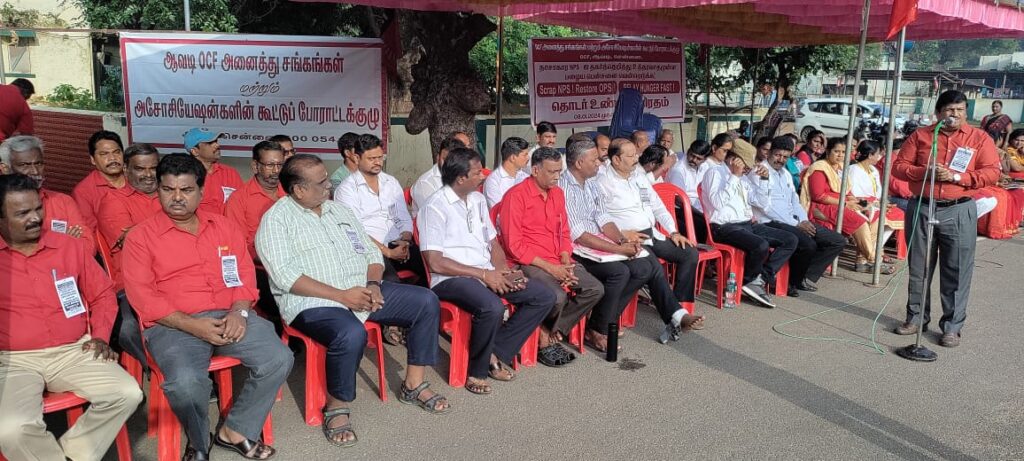
The Chief Justice said that these judges have substantially contributed to the cause of Justice and at the 61-62 years they cannot suddenly jump into practice and go to the High Court. The same is equally applicable to the Central Government and State Government employees who are retiring from Government Service from the NPS scheme. In fact, Article 25 of the Universal Human Rights declaration states that “ every person has the right to an adequate living standard that assures him, along with his family, health and well being, especially concerning feeding, clothing, housing, medical assistance and social services. It also has the right to receive insurance in case of unemployment, sickness, disability, widow hood, old age or any other case in which he may lose his means of life due to circumstances independent of his / her will.”
V.I. Lenin, in 1917 in the erstwhile Soviet Union signed the first Law that Universalized the right to be paid pension to all persons no matter which job they have performed and including the domestic labour as well as peasants. The history of Indian Pension system dates back to the colonial period of British India. The Royal Commission of civil servants in 1881, first awarded pension benefits to the Government employees. The Government of India Acts of 1919 and 1935 further improved the pension. All these schemes were later consolidated and expanded to provide pension for the Government employees because while in service they are bound to hundreds of conditions on their conduct especially they cannot do any other job after their duty hours since they are treated as 24 hours Government Employees. Therefore, it is the duty and responsibility of the Government to take care of the retired life of the Government employees so that they lead a decent and dignified retired life and they cannot be left as orphans at their old age when their body and health doesn’t permit to work and earn for their survival.
We are confident that the people of the country for whom the Government Employees are working day and night will extend all their support to a very genuine struggle of the Central and State Government employees and that too after a patient waiting of more than 20 years. Incidentally, it is to be mentioned that the second Judicial Pay Commission recommended for continuing the defined and guaranteed pension scheme to the Judges and they are not subjected to the NPS. Then we fail to understand that how the Government employees can be discriminated in the matter of pension. We still believe that good wisdom will prevail amongst the decision makers in the Government. Government employees are already mentally prepared for plunging into an indefinite strike. Declaration of the Parliament Election will not have any impact on our strike, since if the Government is concerned about their own employees then they can always take a decision to scrap NPS even before the declaration of election by the Election Commission, concluded, C. Srikumar.


